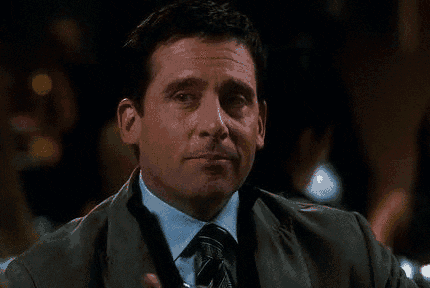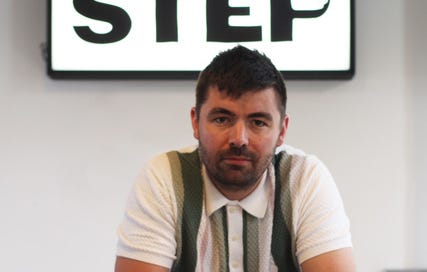Praxis Makes Perfect: Rich Peppiatt
Filmmaker and tabloid whistleblower Rich Peppiatt is making some of the UK's most exciting (and downright naughty) indie documentaries.
The Praxis series is back! This week with someone PERFECT for Chompsky: Rich Peppiatt, who spans the worlds of both film and journalism.

Rich is the founder and creative director of Naughty Step, a production company that creates dynamic video work of many stripes. His story blew up in the news briefly ten years ago, when he blew the whistle on the world of tabloid journalism. At the time a tabloid reporter, his resignation letter calling out the Islamophobia rife in the news industry in the wake of the ‘war on terror’ was published by the Guardian. But the story didn’t end there - after publication, he was followed, received dodgy phone calls, and even death threats.
He went on to give evidence at the Leveson Inquiry about the culture of the press, and a few years later followed this up with an excellent revenge-comedy-documentary (pretty sure that coined a new genre) called One Rogue Reporter…
(Interview lightly edited for brevity and clarity.)
Introduce yourself however you wish!
I’m a filmmaker, I think. I say I think because I do other stuff - write, for example - and have a former career as a journalist that still rears its head from time to time so whatever I call myself always feels a bit of a lie…
Give us the lowdown on your notorious transition out of journalism...
Oh, jeez. You’re requesting not so much a trip down memory lane as a stagger down dog shit alley. Yes, I used to be a journalist in my twenties for a number of tabloid newspapers, including the Daily Star where my conscience belatedly caught up with me and I resigned over the paper’s Islamophobic news agenda.
I say I resigned; I leaked my resignation letter to the Guardian, and it caused a bit of a media bubble storm for a few weeks. I had the disconcerting experience of finding myself on various TV sofas talking about how the sausages of tabloid news are made. And then phone hacking came. And then Leveson. And yes, that resignation letter ended up following me about for a few years! Which is not to say I’m not still a bit proud of my 26 year-old self for writing it, and then actually sending it. As life-changing moments go, I think that’ll always be one of mine.
You've made some excellent, really varied work with Naughty Step - what's the reality of being a working filmmaker in London today?
My first film, One Rogue Reporter, was made with very little money (or filmmaking expertise!) but was picked up by Netflix following its premiere at Sheffield Doc/Fest in 2014. I figured this filmmaking game was easy. Little did I know…
I set up Naughty Step with the little bit of money made from One Rogue Reporter and started doing small branded content jobs to make ends meet whilst trying to get other feature projects off the ground. We landed a contract with The Guardian to make some films, which was a help. Organically, the commercial projects we’ve taken on have got bigger and we’re now competing with some of the big players for TV commercial type work. But it’s a super competitive market and certainly, the past 18 months with the pandemic have been tough going.
You make ads/docs/fiction - what's the ratio of passion projects to money makers, and how often do they overlap?
Big projects take time, years often, to come together and unless you’re independently wealthy you’ve still got to make ends meet between those passion films. A lot of very talented people fall by the wayside because they can’t fill the gaps in between their big projects, or get sucked into the commercial world and lose the focus necessary to get their next big project off the ground. For a few years that was my story; the energy involved in establishing Naughty Step as a business meant the whole reason I wanted to make films in the first place became lost. But I’ve pulled myself back on track and I’m hoping to shoot a feature about an Irish rap group called Kneecap by the end of the year.
You've spoken out against the press industry more than once: after your experiences working as a journalist, and at the Leveson Inquiry. Do you think of yourself as an activist?
I wouldn’t call myself an activist, because I think it does a disservice to all those people who commit, and even give, their lives to activism in a way I never have. Do I care about certain issues and try and use my voice to amplify them and try and further them? Yes. I think that’s important if you consider yourself any type of artist.
As a contributor to the Leveson Inquiry, did you receive any formal warning that the second part would be cancelled?
No, nothing. Now that you mention it, that is a bit rubbish.
What was your reaction to L2 being cancelled?
I can’t say I was shocked. The establishment wagons had been circling for a while. The level of challenge to the established order Leveson Part 2 presented was always going to face strong opposition, and with a Tory government in power the writing was on the wall.
When the Daniel Morgan report came out, did you recognise the industry you had experienced in there? Is it worse than the public knows?
Daniel Morgan was many years before I was a journalist. Even phone hacking was really before my time. But I know the Morgan family a bit and what I can say is that the best of humanity is on display in their behaviour throughout their ordeal, and the worst of humanity has been on display in the corruption that has dogged Daniel’s case.
If you could boil it down to three changes that need to happen in the media industry, what would they be?
The breaking up of media monopolies that have allowed the likes of Murdoch and Rothermere to control the British media landscape to their own ends. The re-establishment of unions as a powerful force within the industry, to project journalists’ ability to take ethical stands. And finally, the separation of comment from fact. We are so used to the emotion-driven journalism we are served today that we forget that the spin, conjecture, and lies by omission which haunt so much of our news isn’t how things have to be.
Stay tuned for more Chompsky interviews with people doing important work in media/politics/workers rights, and SUBSCRIBE 👇👇👇 for all my articles and many other perks, including a weekly newsletter that delivers the week’s international media news, campaigns, and content. Only £5 ($7) a month.
If you can’t subscribe, please support by sharing this newsletter with others you think might be interested. Thanks. 👇👇👇




